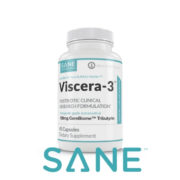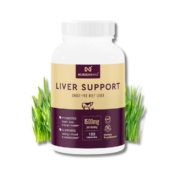About Your Digestive Care
There was a time when digestive care was considered important only for proper digestion of food, absorption of nutrients, and elimination of waste materials. It was thought to be separate from the rest of the body.
That was then where probiotics were thought to actually help your digestive help.
Today, digestive health and postbiotics is known to be a necessary component of your overall health.
Importance of Digestive Health?
Digestive health is dependent upon a precise balance of “good” and “bad” bacteria in the gastrointestinal tract. Bacteria plays a crucial role in health. The human body contains more than 100 trillion bacteria and other microorganisms.1 They outnumber human cells 10 to 1.2 And most of them reside in your digestive tract.
These microorganisms are collectively called the gut’s microbiome, and a healthy microbiome includes a balance of both “good” and “bad” bacteria. An intestinal barrier prevents these microorganisms from escaping into the bloodstream and causing health problems. (This is one of the reasons digestive health was once considered to be a closed system that didn’t affect the rest of the body)
Beneficial bacteria in the digestive system are responsible for many important functions, such as breaking down foods, extracting energy from them, and aiding nutrient absorption. But their influence appears to go much further than this.
Research suggests that gut bacteria may play a role in:
Type 2 diabetes
Obesity
Heart disease
Crohn’s disease
Ulcerative Colitis
Colon cancer
Anxiety
Depression
Autism
Arthritis (3)
How Digestive Health Impacts the Body?
Research suggests there are at least 2 reasons why digestive health may affect overall health: the enteric nervous system and a porous intestinal barrier.
The Enteric Nervous System
The enteric nervous system (ENS) is composed of two thin layers of cells lining your gastrointestinal tract. This lining contains more than 100 million cells. As part of the central nervous system, it communicates with your brain, which is why it’s often referred to as the “second brain”.4
The state of your digestive health (i.e. the composition of your gut bacteria) may influence your mood, cognitive state, and even behavior by sending signals through your nervous system. Research suggests poor digestive health may also contribute to gas, bloating, sluggish metabolism, type 2 diabetes, headaches, fatigue, joint pain, and lowered immunity.5
Poor digestive health may also contribute to a host of other conditions. After all, an estimated 70% to 80% of your immune system resides in your gut via antibodies. (Certain cells lining the gastrointestinal tract excrete large quantities of antibodies into the gut.)6 Put simply, gut bacteria may determine your body’s ability to fight viruses, bacteria, and other toxins that seek to destroy your health.
Porous Intestinal Barrier
As mentioned above, the intestinal barrier is designed to keep gut bacteria and other microbes from entering the bloodstream. The intestinal barrier is composed of a layer of epithelial cells that line the entire gastrointestinal tract. Connecting each cell are proteins called “tight junctions” that act as gates.
These gates keep bacteria and other harmful substances from escaping the gut and entering the bloodstream. They also allow necessary substances, such as water and nutrients, entrance to the gastrointestinal system. This makes it a “semi-permeable” barrier.
If the tight junctions are weakened, however, it creates a porous intestinal barrier that allows bacteria and other toxins to seep into the bloodstream. This condition is called “leaky gut syndrome.”
Conditions associated with leaky gut syndrome include:
- Irritable bowel syndrome
- Crohn’s disease
- Celiac disease
- Candida infection
- Blood sugar imbalances
- Dementia
- Alzheimer’s disease
- Anxiety
- Depression
- Food allergies
- …and many more.
Poor Digestive Care Warning Signs
As you can see, poor digestive care can lead to many serious conditions if not treated. Early warning signs of poor digestive care include:
Solution for Poor Gut Health?
TRIbutyrate!
TRIbutyrate is the superior patented form of Tributyrin, a triglyceride naturally found in butter. The body converts Tributyrin into butyrate.
Butyrate is a short-chain fatty acid (SCFA) and a postbiotic that is created by bacterial fermentation in your lower intestine. Research indicates that postibiotics may be responsible for most of the positive health benefits attributed to fiber and vegetable consumption.
In essence, postbiotics may replace prebiotics and probiotics!
And this is especially true for butyrate. Doctors at Harvard Medical School have discovered that butyrate offers more health benefits than other SCFAs. For this reason, they consider butyrate to be the“optimal” short-chain fatty acid.7
So…why are we recommending that you take TRIbutyrate instead of butyrate supplements?
Two reasons:
Butyrate is such a “stinky” nutrient that you wouldn’t want to take it.
Butyrate rapidly breaks down long before it reaches your colon where it’s needed for digestive care.
To make butyrate more palatable and more stable, scientists combined 3 butyrate molecules with a glycerol molecule. The result is TRIButyrate, a strikingly more effective version of this “optimal” SCFA.8
TRIbutyrate eliminates the need to stuff yourself with vegetables and other fibrous foods that lead to painful and embarrassing gas and bloating.
That’s right.
TRIbutyrate gives you many of the same health benefits as fiber without suffering painful digestive issues!
This superior form of Tributyrin is time-released directly into your lower colon (the only place it can provide all these life-changing benefits). That is why it is the main active ingredient in our new one-of-a-kind gut health breakthrough Viscera-3™.
REFERENCES
1- Allday E. 100 trillion good bacteria call human body home. SF Gate. Jul 3, 2012. https://www.sfgate.com/health/article/100-trillion-good-bacteria-call-human-body-home-3683153.php
2- National Institutes of Health. NIH Human Microbiome Project defines normal bacterial makeup of the body. NIH. Jun 13, 2012. Accessed Nov 11, 2020. https://www.nih.gov/news-events/news-releases/nih-human-microbiome-project-defines-normal-bacterial-makeup-body
3- WebMD Medical Reference. What Your Gut Bacteria Say About You. WebMD. Reviewed by Minesh Khatri, MD on May 28, 2020. Accessed Nov 11, 2020. https://www.webmd.com/digestive-disorders/what-your-gut-bacteria-say-your-health#2
4- Johns Hopkins Medicine. The Brain-Gut Connection. Accessed Nov 11, 2020. https://www.hopkinsmedicine.org/health/wellness-and-prevention/the-brain-gut-connection
5- Lord D. Your Body’s Second Brain – The Importance of Gut Health. Jun 1, 2015. Accessed Nov 11, 2020. http://www.navacenter.com/community/article-library/browse/2015/06/01/your-body’s-second-brain—the-importance-of-gut-health
6- Fields H. The Gut: Where Bacteria and Immune System Meet. Johns Hopkins Medicine. Nov 2015. Accessed Nov 12, 2020. https://www.hopkinsmedicine.org/research/advancements-in-research/fundamentals/in-depth/the-gut-where-bacteria-and-immune-system-meet
7- Verma MS, Fink MJ, Salmon GL, Fornelos N, Ohara TE, Ryu SH, Vlamakis H, Xavier RJ, Stappenbeck TS, Whitesides GM. A Common Mechanism Links Activities of Butyrate in the Colon. ACS Chem Biol. 2018 May 18;13(5):1291-1298. doi: 10.1021/acschembio.8b00073. Epub 2018 Apr 10. PMID: 29584955. https://pubmed.ncbi.nlm.nih.gov/29584955/
8- Edelman MJ, Bauer K, Khanwani S, Tait N, Trepel J, Karp J, Nemieboka N, Chung E, Van Echo D. Clinical and pharmacologic study of tributyrin: an oral butyrate prodrug. Cancer Chemother Pharmacol (2003) 51: 439–444. https://tahomaclinic.com/Private/Articles4/Tributyrin/Edelman%202003%20-%20Clinical%20and%20pharmacologic%20study%20of%20tributyrin.pdf
















